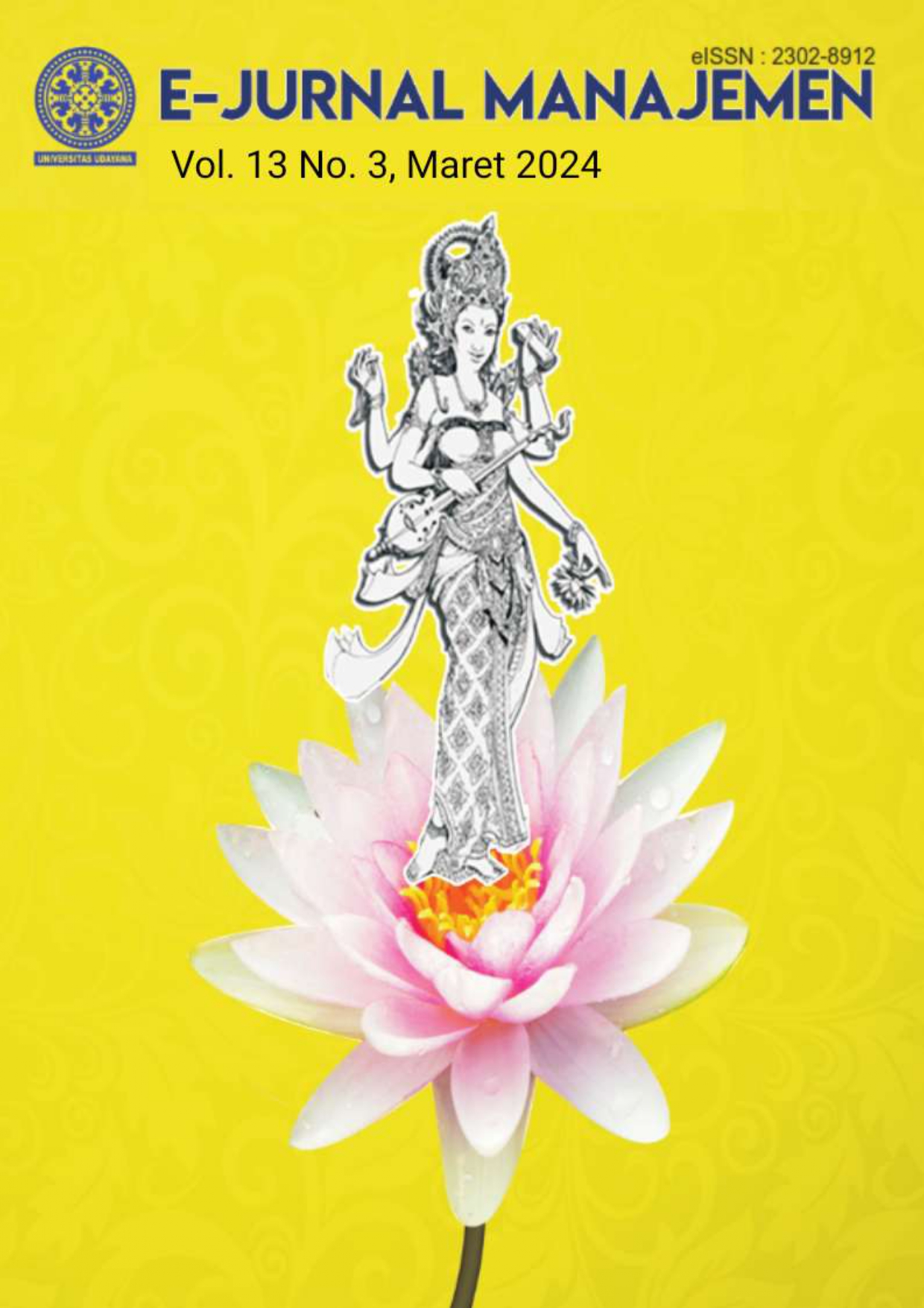PENGARUH WORK-FAMILY CONFLICT TERHADAP WITHDRAWAL BEHAVIOR DENGAN STRES KERJA SEBAGAI PEMEDIASI
Abstract
Penelitian ini bertujuan untuk menganalisis pengaruh work-family conflict terhadap withdrawal behavior pada karyawan Hotel Kampung 168. Penelitian ini dilakukan di Hotel Kampung 168 dan menggunakan Attribution Theory. Penelitian ini melibatkan 67 responden melalui sampling jenuh dan pengumpulan data dilakukan dengan metode kuesioner dan wawancara, serta menggunakan uji asumsi klasik, analisis jalur dan uji Sobel. Hasil menunjukkan bahwa work-family conflict berkontribusi positif dan signifikan terhadap withdrawal behavior; work-family conflict berpengaruh positif dan signifikan terhadap stres kerja; stres kerja berpengaruh positif dan signifikan terhadap withdrawal behavior; dan stres kerja memediasi hubungan antara work-family conflict dan withdrawal behavior. Implikasi manajerialnya adalah perlunya sistem dukungan internal perusahaan untuk mengurangi stres kerja, yang dapat mengurangi withdrawal behavior karyawan. Studi ini memberikan kontribusi pada pemahaman dinamika perilaku karyawan di industri perhotelan.
This research aims to analyze the influence of work family conflict on withdrawal behavior among Hotel Kampung 168 employees. The research was conducted at Hotel Kampung 168 involving 67 respondents, who were selected through a saturated sampling technique, and using attribution theory as the basis for the analysis. Data collection was carried out using questionnaires and interviews, as well as using the classic assumption test, path analysis and Sobel test. The results show that work family conflict contributes positively and significantly to withdrawal behavior; work family conflict has a positive and significant effect on work stress; work stress has a positive and significant effect on withdrawal behavior; and work stress mediates the relationship between work family conflict and withdrawal behavior. The managerial implication is the need for an internal company support system to reduce work stress, which can reduce employee withdrawal behavior. This study contributes to the understanding of the dynamics of employee behavior in the hospitality industry.
Downloads
References
Alkusani, A., & Sukaris, S. (2019). Pengaruh Job-Engagement Terhadap Perilaku Withdrawal Melalui Komitmen Organisasi. Jurnal Riset Entrepreneurship, 2(1), 43–51.
Amelia, A. (2010). Pengaruh work to family conflict dan family to work conflict terhadap kepuasan dalam bekerja, keinginan pindah tempat kerja, dan kinerja karyawan. Jurnal Ekonomi Dan Bisnis, 4(3), 201–219.
Ariansyah, R. (2019). Pengaruh Job Insecurity, Stres Kerja, dan Kepuasan Kompensasi Terhadap Intention To Quit Karyawan PT. Mandala Finance Tbk Cabang Idi.
Bazana, S., & Dodd, N. (2013). Conscientiousness, work family conflict and stress amongst police officers in Alice, South Africa. Journal of Psychology, 4(1), 1–8.
Divara, I. G. A. G. K., & Rahyuda, A. G. (2016). Pengaruh work family conflict terhadap stres kerja dan komitmen organisasional pegawai kontrak dinas kebudayaan provinsi bali. Udayana University.
Durachim, E. D., & Hamzah, F. (2017). Restoran Bisnis Berbasis Standar Kompetensi. Jurnal Pariwisata, 4(1), 10–21.
Erkmen, T., & Emel, E. (2014). Work-family, family work conflict and turnover intentions among the representatives of insurance agencies. Journal of Business Economics and Finance, 3(3), 302–312.
Ghayyur, M., & Jamal, W. (2012). Work-family conflicts: A case of employees’ turnover intention. International Journal of Social Science and Humanity, 2(3), 168.
Mudiartha Utama, W. (2011). Manajemen Sumber Daya Manusia. UPT Penerbit Universitas Udayana.
Noroozi, D., & Abdi Masumabad, S. (2015). The role of spiritual intelligence in employees’ withdrawal behaviors in physical education organization. International Journal of Organizational Leadership, 4, 60–71.
Paramita, I. G. A. M., & Subudi, M. (2017). Pengaruh Konflik Pekerjaan-Keluarga Terhadap Turnover Intention Melalui Mediasi Kepuasan Kerja Pada Hoki Bank Cabang Gatot Subroto. Udayana University.
Parvaiz, L., Batool, S., Khalid, A., & AftabFarooqi, Y. (2015). Impact of stressors (role conflict, role overload, leadership support and organizational politics) on job stress and its subsequent impact on turnover intention. International Journal of Business and Management Invention, 4(10), 52–63.
Pollack, J. M., & Jimmy, H. (2012). The Influence of Occupational Stress and Role Conflict on Withdrawal Intention. Journal of Management and Psychology, 2(1), 45–57.
Putra, D. M. B. A., & Mujiati, N. W. (2019). Peran Kepuasan Kerja Dalam Memediasi Pengaruh Stres Kerja Dan Motivasi Kerja Terhadap Turnover Intention. Udayana University.
Rabenu, E., Tziner, A., & Sharoni, G. (2017). The relationship between work-family conflict, stress, and work attitudes. International Journal of Manpower, 38(8), 1143–1156.
Rurkkhum, S. (2018). The impact of person-organization fit and leader-member exchange on withdrawal behaviors in Thailand. Asia-Pacific Journal of Business Administration, 10(2/3), 114–129.
Sedigh, G., Devlin, R. A., & Grenier, G. (2017). Are quebecers more stressed out at work than others? An investigation into the differences between Quebec and the rest of Canada in level of work stress. Canadian Public Policy, 43(3), 177–189.
Tamaela, E. Y. (2011). Konsekuensi konflik peran, kelebihan beban kerja dan motivasi intrinsik terhadap burnout pada dosen yang merangkap jabatan struktural. Jurnal Ilmiah Aset, 13(2), 111–122.
Turan, A. (2015). Examining the impact of Machiavellianism on psychological withdrawal, physical withdrawal and antagonistic behavior. Global Business and Management Research, 7(3), 87.
Yasa, I. G. R., & Dewi, A. (2019). Pengaruh stres kerja terhadap kepuasan kerja dengan motivasi kerja sebagai variabel mediasi. E-Jurnal Manajemen Unud, 8(3), 1203–1229.
Yoong, L. (2013). The Effect of Occupational Stress and Compentation on Withdrawal Behaviour. Journal Of Business and Psychology, 1(1), 40–51.





















